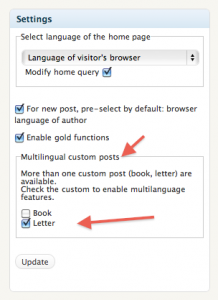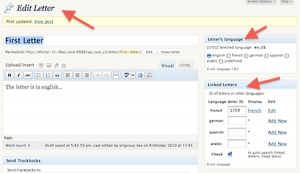Forum Replies Created
-
AuteurArticles
-
I am not expert with call to google maps… But as data-designer, in this multilingual context, it is good to create a post in each language and insert inside this post a link or a call (adapted with part or the maps and language) to the targeted map. If necessary a small code can be used (for shortcode inserted in body or by using post-meta)…
Michel
dev.xiligroup.com
[ updated – june 4th ] xili-tidy-tags (next release 1.6.0) is yet ready to manage custom post_type and custom taxonomy. But reserved for webmasters with good knowledge in WP (and php) to activate it in these new db contexts.
…
xili-tidy-tags (latest release 1.4.3) is yet only usable with built_in type ‘post’ and ‘page’. Taxonomies (tags) of custom post types made by developers are not foreseeable.
Some tests are forecasted if the webmaster has created a new custom post using the same tags of built_in type ‘post’ and ‘page’.
Don’t hesitate to open a topic in forum.For webmasters using custom post type: xili-language version 1.8.0 is shipped !
They don’t need to add php lines to show meta boxes (Post’s language and linked posts in other languages) on ‘edit post window’ in dashboard (custom post type with property « show_ui » true)
xili-language detects automatically when new custom post types are available. The webmaster only need to check the custom type if it needs to be multilingual.[caption id="attachment_1703" align="aligncenter" width="218" caption="Checking multilingual custom post type"]
 [/caption]
[/caption]If you need more details: open a topic in forum.
xili-language permet une organisation multi-langage des articles (post) et pages (page). L’arrivée des contenus personnalisés (custom post type) permet depuis les versions 2.9 et notamment 3.0 de créer des types de ‘post’ très variés auquels on peut ajouter une taxinomie propre (classification, mots-clés,..). Pour les concepteurs, les versions antérieurs de xili-language étaient compatibles mais nécessitaient de déclarer, via quelques lignes php, les nouveaux contenus pour que l’on puisse les affecter à une langue donnée.
La version 1.8.0 analyse automatiquement ces nouveaux types (ayant la propriété « show_ui » vraie), et remplit une liste à cocher de l’interface de réglages de xili-language. Le webmestre peut donc à loisir choisir lequels de ces types doivent être multilingues.[caption id="attachment_1703" align="aligncenter" width="218" caption="Réglage des contenus personnalisés en mode multilingue"]
 [/caption]
[/caption]Dès lors qu’un custom type est coché, dans la page auteur / éditeur, la boite d’affectation de la langue et la boite des liens avec les contenus du même type dans l’autre langue sont visibles à droite.
[caption id="attachment_1707" align="aligncenter" width="300" caption="Exemple de contenus personnalisés (custom post type)"]
 [/caption]
[/caption]Par exemple, si des fiches ‘book’ donc des livres sont présentes, le libraire pourra affecter une fiche au livre dans sa langue d’origine et une fiche liée au livre traduit dans une autre langue.
NOTE : La création de ces contenus personnalisés (qui sont stockés dans la table des posts et pages) nécessitent une analyse du modèle de données bien ciblée. En effet, mal menée, on risque de se retrouver avec des requêtes très compliquées pour présenter et retrouver ces fiches. Si cela vous intéresse, ouvrez un fil sur le forum et on en discutera.
To do that you must use embedded new taxonomy functions inside plugin’s source :
get_terms_of_groups_new ( $group_id, $taxonomy, $taxonomy_child, $args )Here I write a ‘raw’ example delivering expected array (here only print_r)
/**
* example of selection of tags of a group as used in xili-tidy-tags dashboard<br />
* only for tests<br />
*
*/
function xili_tags_from_group($group_name) {
// from $group_name to ID
$taxonomy = TAXOTIDYTAGS ;
$taxonomy_child = 'post_tag' ;
$groupterm = term_exists($group_name, $taxonomy);
$group_id = $groupterm['term_id'];
// return array of tags as object
$args = array('orderby' => 'name', 'order' => 'ASC', 'hide_empty' => false ); // even if no post attached to a tag - see doc inside source of xili-tidy-tags
$thetags = get_terms_of_groups_new ( $group_id, $taxonomy, $taxonomy_child, $args );>
print_r($thetags);
// example of array as expected by S.Y. but here with key -
$result_array = array();
if ( $thetags ) {
foreach ( $thetags as $onetag ) {
$result_array[] = array('tag_name' => $onetag->name, 'tag_id' => $onetag->term_id);
}
print_r($result_array);
}
}The default taxonomy (see file taxonomy.php in folder wp-includes) is very poweful but don’t include the queries to group tags under one another tag. Is is the purpose of this plugin xili-tidy-tags created since WP 2.7 ! Initially created to group tags by language, he structurally contains all functions to group tags by semantic groups AND one tag can belong to one or more groups.
Michel
dev.xiligroup.com
Thanks for you question. I imagine it is the language list widget. It is based on the template tag xili_language_list. To suppress the « in » before the language in the root english in WP. you must create a (short) .po and .mo file in theme’s lang folder for english (en_US.po) with couple msgid as « in english » and msgstr as « english » and so on…
If you don’t like poEdit, prefer xili-dictionary plugin
If your site is professional, don’t hesitate to support us by asking services (affordable fees)
Michel of dev.xiligroup.com team
THE TODAY QUESTION (via contact page)
I’m looking to use xili tidy tags as a way to group my tags to make them more easily searchable – i’m hoping to be able to take each group and use them to populate select boxes on the website for filtering purposes. I was wondering if you could provide me with a rundown of how to access the tag grouping outside the loop? Since there’s not much documentation on the templating for xili tag groups, I can’t work out how to do that.
Thanks,
Stephen
TODAY ANSWER
I am not totally sure to understand your question. The plugin xili-tidy-tags contains a template tag (and widget) to display tags as cloud or list (sub cloud) of words. Do you need a way to display the name of groups ? Is the enduser side concerned or the author’s dashboard ?
Thanks for your details
Michel
dev.xiligroup.com
Hello,
Thanks for your question,
As you can see here in http://multilingual.wpmu.xilione.com , the menu of current theme (twentyten as provided by WP) is translated if the language of the post is changed from one language to another. To do that : the theme must contains the good .mo files for each language and each file must contains the whole translation of terms used by theme and category and menu… You can use poEdit but most easily use xili-dictionary plugin.
For pages, if a page has his equivalent in other language, plugin changes the menu item and link (as you can see in demo cited above About -> A propos).
See review of Jacob in http://wordpress.org/extend/plugins/xili-dictionary/ (link at bottom right).
If your website is commercial, it is possible to have paid services to help you.
Michel of dev.xiligroup.com
Thanks for your question
A little recall for category translation :
Your site must choose a root language, currently english.
The .mo file (machine translation of .po file) must contain the translations of term and description of each category – you can do it by hand with poedit app. or better with xili-dictionary plugin which is able to import the terms of categories and to list them for translation and finally rebuid the .mo file saved in the theme’s folder.
See review of Jacob in http://wordpress.org/extend/plugins/xili-dictionary/ (link at bottom right).
If your website is commercial, it is possible to have paid services to help you.
Michel of dev.xiligroup.com
Thanks for your question.
This feature as described is yet in the « todo » list for future versions. I am studying a easy way to combine a query assembling posts with one language and posts with undefined language. The WP query is under tests now (but very complex).
For your examples with pictures, don’t forget that legend are not in the same language, so with only one attachment (the picture) it is better if you create one post per language including « caption » for this language around the link to img !
What is the URI of your site ?
-
AuteurArticles


